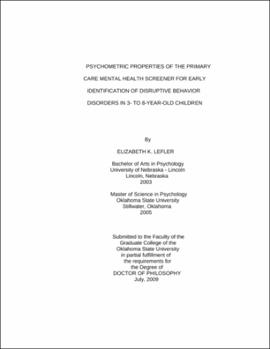| dc.contributor.advisor | Sullivan, Maureen A. | |
| dc.contributor.author | Lefler, Elizabeth K. | |
| dc.date.accessioned | 2013-11-26T08:27:42Z | |
| dc.date.available | 2013-11-26T08:27:42Z | |
| dc.date.issued | 2009-07 | |
| dc.identifier.uri | https://hdl.handle.net/11244/6959 | |
| dc.description.abstract | Scope and Method of Study: The Disruptive Behavior Disorders (DBDs), as defined in the Diagnostic and Statistical Manual of Mental Disorders - Fourth Edition (DSM-IV; American Psychiatric Association, 1994), are Attention Deficit/Hyperactivity Disorder (ADHD), Oppositional Defiant Disorder (ODD), and Conduct Disorder (CD). It has been suggested that treatment outcomes for DBDs will be more positive if mental health professionals are able to intervene at the earliest signs of a disorder (Keenan & Wakschlag, 2002). Early intervention is important because of the short-term and life-long difficulties encountered by individuals with childhood psychopathology (Lavigne et al., 1998; Speltz, McClellan, DeKlyen, & Jones, 1999; Stormont, 2000; Borowsky, Mozayeny, & Ireland, 2003; Moffitt & Caspi, 2001). However, it is uncommon for mental health services to be obtained, and when they are obtained it is not typically as part of a family's first line of care (Ringel & Sturm, 2001). It has been proposed that pediatricians and family practitioners, who have frequent, early contact with very young children, may be in the best position to detect early signs of DBDs and other mental health concerns (Huffman & Nichols, 2004). The Primary Care Mental Health Screener (PCMHS; Hartung & Lefler, 2009) may be an appropriate measure if it proves to have adequate reliability and predictive validity. The PCMHS takes approximately 10 minutes to complete, does not require extensive pediatrician or pediatric staff training, covers a wide range of childhood mental health problems, is written at an 8th grade reading level, is DSM-IV-based, and includes items that research has shown may be more appropriate for girls (i.e., relational aggression, Crick & Grotpeter, 1995). The current study measured the internal consistency reliability of the PCMHS, as well as its predictive validity by comparing the results of the PCMHS to a broader, evidence-informed psychological evaluation to ascertain the predictive validity of the PCMHS. | |
| dc.description.abstract | Findings and Conclusions: The PCMHS was found to have excellent internal consistency reliability for inattention, hyperactivity, and oppositionality, but not for conduct problems. Also, to test for predictive validity, Bayesian analyses were conducted to assess the sensitivity, specificity, negative predictive power (NPP), and positive predictive power (PPP) of scores on the PCMHS. Results were mixed. Finally, to test the convergent and discriminant validity of the PCMHS, a multi-trait/multi-method matrix was created to determine the correlations between constructs. Specifically, convergent validity was tested by correlating PCMHS subscale scores with similar constructs from different measures. All correlations were statistically significant. Conversely, discriminant validity was tested by comparing the correlations of similar constructs to the correlations of dissimilar constructs. Results were mixed. Implications, limitations, and future directions for research in primary care mental health screening are discussed. | |
| dc.format | application/pdf | |
| dc.language | en_US | |
| dc.rights | Copyright is held by the author who has granted the Oklahoma State University Library the non-exclusive right to share this material in its institutional repository. Contact Digital Library Services at lib-dls@okstate.edu or 405-744-9161 for the permission policy on the use, reproduction or distribution of this material. | |
| dc.title | Psychometric properties of the primary care mental health screener for early identification of disruptive behavior disorders in 3- to 8-year-old children | |
| dc.contributor.committeeMember | Chaney, John M. | |
| dc.contributor.committeeMember | Harrist, Amanda W. | |
| dc.contributor.committeeMember | Leffingwell, Thad Ryan | |
| osu.filename | Lefler_okstate_0664D_10422 | |
| osu.accesstype | Open Access | |
| dc.type.genre | Dissertation | |
| dc.type.material | Text | |
| thesis.degree.discipline | Clinical Psychology | |
| thesis.degree.grantor | Oklahoma State University | |
